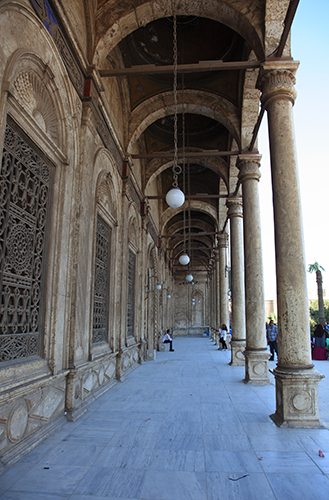Once Mo'men started his history presentation on the Canal I couldn't wait to hear him talk about Nasser. Nasser led the 1952 revolution in overthrowing King Farouk. He also led Egypt in resisting the invasion by Britain, France and Israel in 1956 and restoring sole control of the Suez Canal to Egypt, a victory considered to have erased a mark of national humiliation. He adopted many a socialist measure. He practiced authoritarianism. It shouldn’t be hard, therefore, to see a similarity between Nasser and Mao. In a sense, Nasser was to the Egyptians as Mao was to the Chinese during their respective times. Nasser died in 1970. Mo'men is only in his 20s. I thought it would be interesting to see how young people like Mo'men viewed Nasser. A comparative study of some sort may help shed light on why, despite the disasters Mao brought about, he is still worshiped by so many in today's China.

Mo'men did not disappoint. “Nasser was a hero,” he gushed. “He made mistakes, but he was a hero. He got us back the Canal, if nothing else”, Mo'men continued. It was obvious that Mo'men's adoration for Nasser was first and foremost based on patriotism. He also compared the Mubarak period with that of Nasser's, insisting that there wasn't nearly as much corruption during the latter's reign.

These, of course, are familiar refrains one hears in connection with Mao. Mao was the one who drove imperialist influence out of China. He was the one who rid the country of corruption. But what about the millions who starved to death due to his brazen communist experiment with agriculture? What about the millions more who perished during his numerous political power plays?

People can debate about Mao till the end of time. To me, the debate is largely fruitless, as a Cartesian pursuit anyway, as the two sides to the debate are fundamentally expressing their diametrically opposed beliefs about human nature. Those who sing sincere praises of Abraham Lincoln tend to believe human beings can come together by overcoming their prejudices in adopting a set of universal values. Surely we human beings, because of our empathetic nature, are capable of extending our love across racial and national lines. Lauding Mao are those who poo-poo the idea of universal values because of their belief that self-preserving instincts inevitably drive people apart. Even if Lincoln was himself a real saint, most of those who advertise him do so out of selfish nationalistic motives, they figure. These people feel the need for a Chinese hero to go tit for tat versus Lincoln worshippers. There is, alas, not one of Lincoln's ilk in the entire history of China. So Mao will have to do. In a struggle over nationalistic interests, Mao’s being Chinese trumps all of his sins, imagined or real.

The pro-Mao and anti-Mao debate is akin to religious debates; triumphs take not rational persuasion but a leap of faith. However, it is much more complicated than religious debates. Empathy and self-preservation are two sides of the coin of human survivability. One can't exist without the other as each is the extension of the other. The line in between is not only blurred, but it also differs from person to person. When the pro-Mao and anti-Mao debate is viewed as based on this dichotomy of human nature, our animal side versus the human side, dark against bright, it becomes clear that, as much pain as it causes on both sides, the war of words will rage on. But I digress.





